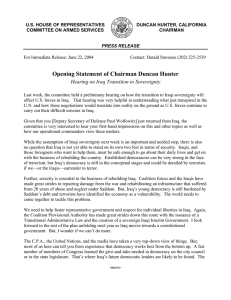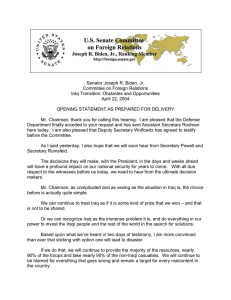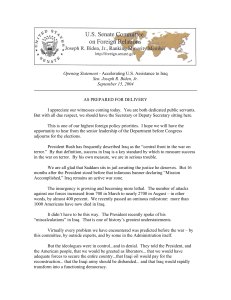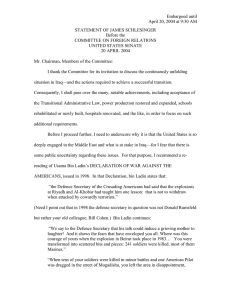Senate Foreign Relations Committee Chairman Richard Lugar Opening Statement for Hearing on
advertisement
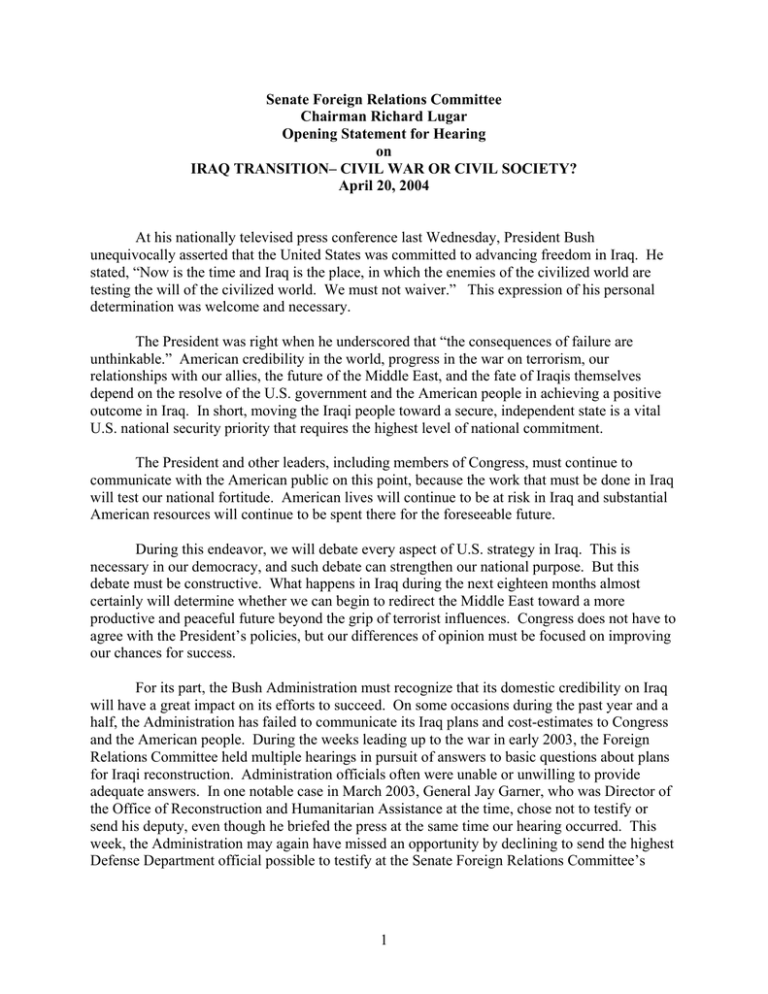
Senate Foreign Relations Committee Chairman Richard Lugar Opening Statement for Hearing on IRAQ TRANSITION– CIVIL WAR OR CIVIL SOCIETY? April 20, 2004 At his nationally televised press conference last Wednesday, President Bush unequivocally asserted that the United States was committed to advancing freedom in Iraq. He stated, “Now is the time and Iraq is the place, in which the enemies of the civilized world are testing the will of the civilized world. We must not waiver.” This expression of his personal determination was welcome and necessary. The President was right when he underscored that “the consequences of failure are unthinkable.” American credibility in the world, progress in the war on terrorism, our relationships with our allies, the future of the Middle East, and the fate of Iraqis themselves depend on the resolve of the U.S. government and the American people in achieving a positive outcome in Iraq. In short, moving the Iraqi people toward a secure, independent state is a vital U.S. national security priority that requires the highest level of national commitment. The President and other leaders, including members of Congress, must continue to communicate with the American public on this point, because the work that must be done in Iraq will test our national fortitude. American lives will continue to be at risk in Iraq and substantial American resources will continue to be spent there for the foreseeable future. During this endeavor, we will debate every aspect of U.S. strategy in Iraq. This is necessary in our democracy, and such debate can strengthen our national purpose. But this debate must be constructive. What happens in Iraq during the next eighteen months almost certainly will determine whether we can begin to redirect the Middle East toward a more productive and peaceful future beyond the grip of terrorist influences. Congress does not have to agree with the President’s policies, but our differences of opinion must be focused on improving our chances for success. For its part, the Bush Administration must recognize that its domestic credibility on Iraq will have a great impact on its efforts to succeed. On some occasions during the past year and a half, the Administration has failed to communicate its Iraq plans and cost-estimates to Congress and the American people. During the weeks leading up to the war in early 2003, the Foreign Relations Committee held multiple hearings in pursuit of answers to basic questions about plans for Iraqi reconstruction. Administration officials often were unable or unwilling to provide adequate answers. In one notable case in March 2003, General Jay Garner, who was Director of the Office of Reconstruction and Humanitarian Assistance at the time, chose not to testify or send his deputy, even though he briefed the press at the same time our hearing occurred. This week, the Administration may again have missed an opportunity by declining to send the highest Defense Department official possible to testify at the Senate Foreign Relations Committee’s 1 hearings. We are appreciative of the officials who will be here, and we look forward to their testimony on Thursday. Our experiences with inadequate planning and communication related to Iraq contribute to the determination of this Committee to impose a very high standard on the information provided about Iraq. We understand that some information is classified and cannot be dealt with in open session. We also understand that not every official we would like to testify will be available for every hearing. But within the substantial bounds of our oversight capacity we will attempt to illuminate U.S. plans, actions, and options with respect to Iraq – both for the benefit of the American people and to inform our own policymaking role. The Administration must present a detailed plan to prove to Americans, Iraqis, and our allies that we have a strategy and that we are committed to making it work. This will be the first of three Foreign Relations Committee hearings this week on Iraq. We intend to explore whether American and Iraqi authorities are ready for the transition to Iraqi sovereignty on July 1 and what steps are required to fill out a comprehensive transition plan. In our current series of three hearings, the Committee first will attempt to discover the details of Ambassador Lakhdar Brahimi’s plan for an interim Iraqi Government to which a transfer of sovereignty is planned on June 30, 2004. Specifically, what executive and legislative positions will be established in the interim government and how will these positions be filled? Are we confident that Iraqis will support the United Nations formula for a new government, and what will the U.S. do if Iraqis reject the Brahimi plan? Second, what status of forces agreement will make clear that the United States and Coalition armed forces will continue to provide internal and external security for the new Iraqi Government, and will that agreement make clear the chain of command and the relationship of Iraqi police, reserves, and army personnel with U.S. and coalition forces? Third, will United Nations Security Council resolutions undergird the international legitimacy of the new Iraqi government and all of the security arrangements that it will require? Continuing and expanded support of the new Iraqi government by other nations may require these additional Security Council resolutions. Fourth, will elections for the Transitional and Permanent Iraqi governments – scheduled for January 2005 and December 2005, respectively -- be held under the auspices of the United Nations or under some other authority? How will that authority provide security for the elections and assemble a registration list or otherwise determine who is eligible to vote? How will we deal with elections that are postponed or deemed to be fraudulent? Will the National Assembly that is to be elected in January 2005 have full authority to write a constitution and construct the framework of a permanent government? Fifth, we were pleased to learn that President Bush has designated U.N. Ambassador John Negroponte as his nominee to be the U.S. Ambassador to the new Iraqi government. What will be the composition and the time of arrival of all of the U.S. personnel associated with the new Embassy? 2 Sixth, will the costs associated with the new diplomatic presence be covered by a transfer of funds under the umbrella of the $87 billion appropriation enacted by the Congress last year? If not, what is the plan for providing the necessary funding? Clear answers to all of these questions would constitute a coherent plan for Iraq. The American public should have the opportunity to view this plan and carefully monitor its progress. To help spell out such a plan is an important responsibility for a Congressional Committee, as part of a well-functioning constitutional system of checks and balances. We will also want to discuss how Iraqis are preparing to take over the police and security functions of a sovereign state. Equipment and training for these forces are needed urgently. Contracting problems have delayed delivery. Reports that some Iraqi units refused to be deployed and others actually supported insurgent factions are part of a sober assessment of the Iraqi role in the security plan. The Iraqis need to know that there is a difference between an occupied Iraq and a sovereign Iraq. Our public information efforts must become a lot better in demonstrating to Iraqis the advantages of new freedoms. We must find more effective ways of spurring the public dialog in Iraq and supporting the aspirations of the majority of Iraqis who want peace and democracy, but who have been intimidated by purveyors of violence who cloak their actions in false nationalism. Bands of insurgents, terrorists, and murderers have made the process more difficult, but must not be allowed to determine the outcome in Iraq. To begin our examination of these questions the Committee is pleased to be joined by two impressive panels of experts today. On the first panel, we welcome Dr. James Schlesinger, former Secretary of Defense and Secretary of Energy, and now Senior Advisor at Lehman Brothers. Dr. Schlesinger recently served as Co-Chair of a Council on Foreign Relations Task Force that published a comprehensive report entitled “Iraq – One Year After.” We also welcome Mr. Sandy Berger, former National Security Advisor under President Clinton and currently Chairman of Stonebridge International. On our second panel, we will welcome Dr. Richard Perle, of the American Enterprise Institute; Mr. Toby Dodge of the International Institute for Strategic Studies; and Dr. Juan Cole, of the University of Michigan. We look forward to the assessments and recommendations of our witnesses. 3

